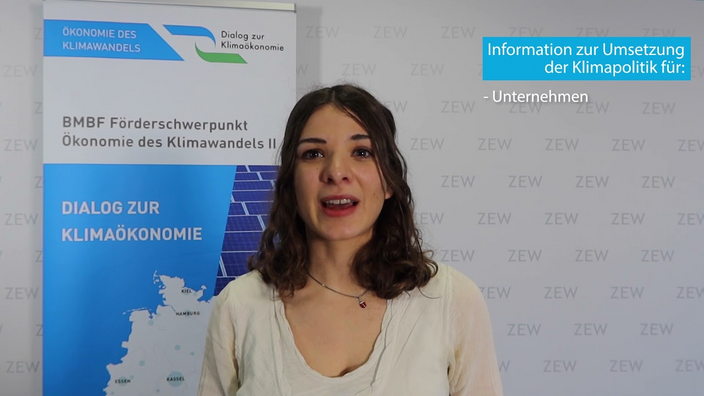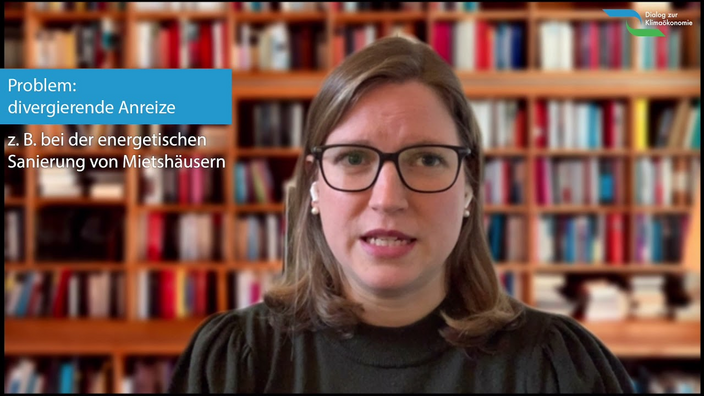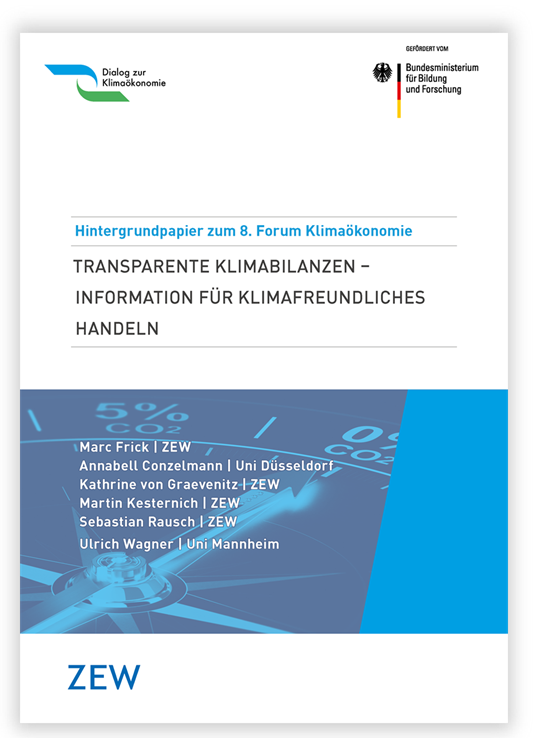Forum Climate Economics 8
Transparent Climate Footprints – Information for Climate-Friendly Action
The virtual Forum Climate Economics 8 - Informed Policies and Information as Policy

With the topic "Transparent climate footprints - information for climate-friendly action" the Forum Climate Economics 8 took place on February 23, 2021. In a virtual pandemic format, experts discussed the necessity, availability and effectiveness of information for effective climate policy in a video conference circuit. Around 250 invited representatives from politics, business, civil society and academia followed the live stream of the forum and contributed to the discussion via accompanying polls, interaction and chat options. Given the increasing need for information on greenhouse gas balances due to the tightening of European climate protection targets, the forum sees information not only as an important basis for informed policy but also as a policy tool - changing awareness and behaviour through its targeted provision.
What cannot be measured cannot be improved
The introductory words of Prof. Gernot Klepper, Prof. Achim Wambach and the State Secretary at the Federal Ministry of Education and Research (BMBF) Prof. Wolf-Dieter Lukas already emphasised the importance of information in the fight against climate change. Consumers in particular often simply lacked the necessary information to make climate-friendly decisions. Policy instruments such as a border carbon adjusment mechanisms (CBAM) also need far more information than is currently available. Data from science and business would have to form the basis for policy actions, as was the case with the introduction of the national emissions trading system.
In his keynote address, Andreas Löschel calls for using the market and competition as a discovery and coordination process

In his keynote speech, Prof. Dr. Andreas Löschel, Chairman of the Expert Commission of the Federal Government's monitoring process "Energy of the Future", first emphasised the need to adjust the (short-term) sectoral targets in the German Climate Protection Plan 2050 given more stringent European targets. However, he warned against trying to plan the achievement of the long-term goal of climate neutrality in 2050 on the drawing board based on current information and model calculations, as a large part of the required technologies are not yet on the market or are still in the trial and demonstration phase. From an economic point of view, the focus on CO2 pricing is necessary, because these market-based instruments work well and enable a reduction of greenhouse gas emissions precisely when detailed information for households or companies is not available. Accompanied by an improvement of the infrastructure, the expansion of the grids and targeted research funding, the market should be used as a discovery and coordination process by bringing together the multitude of actors (households, companies) who should or wanted to contribute to climate protection.
Löschel explained that the determination and certification of a product's carbon footprint - the amount of emissions along the entire supply chain - is a prerequisite for industrial policy measures and must be credible and reliable. In this way, sustainability can be used as a competitive advantage and consumers' purchasing decisions can be positively influenced.
Delara Burkhardt adds political perspective as a Member of the European Parliament

In her contribution, Delara Burkhardt (Member of the European Parliament for Schleswig-Holstein, SPD) first emphasised that she sees the relatively new social discussion about the goal of climate neutrality by the middle of the century as a momentum in climate policy. This should be used to achieve the necessary transformation. The package of measures of the European Green Deal and the Corona Reconstruction Fund, a good third of whose funds are earmarked for climate protection measures, offer a historically unique opportunity. Under no circumstances should these funds be put into yesterday's economy.
As a member of the European Parliament, she sees the responsibility primarily with politics, which must set the framework conditions for the transformation. This also applies to the creation of transparency with regard to supply chains. Her conclusion: "For a successful socio-ecological transformation, reliable and transparent information for politicians, companies and citizens is indispensable. Here, the legislator is called upon to set the right framework conditions, clearly define sustainability criteria and adopt reporting and disclosure obligations." She also appealed to the scientific community to keep an eye on the scenarios on which the political decisions in Brussels are based, to intervene where necessary and to achieve greater scope.
Panel discusses the role of information as a driver of climate-friendly action
Moderated by Conny Czymoch and Prof. Martin Kesternich (ZEW), Delara Burkhardt and Andreas Löschel then discussed together with Joachim Lutz (Dean of the Faculty of Business Administration at the University of Mannheim) and Udo Sieverding (Member of the Executive Board of the Verbraucherzentrale NRW) via video conference to what extent information can act as a driver of climate-friendly action. Two video sequences lightened up the discussion. They introduced topics and discussion points that had already been addressed on February 9 and 11 in the virtual roundtables preceding the Forum Climate Economics 8:
CO2 prices, transparent carbon footprints, border carbon adjustments - what role do they play in climate protection for European companies?
The first roundtable on February 9, 2021 –moderated by Dr. Katherine von Graevenitz (ZEW) – discussed the question of the importance of climate policy and information on CO2 balances for German companies, their CO2 emissions and their competitiveness. Elisa Rottner (ZEW) reported on the following impulses contributed by practitioners on the topic:
- Potential for reducing CO2 emissions in the German industry lies in an increased circular economy. Process emissions can be achieved through CCS/CCUS (Carbon Capture and Storage/Utilisation and Storage). Households contribute with the increased demand for climate-friendly products.
- Sector-specific circumstances must also be taken into account when designing CO2 pricing in order to avoid "carbon leakage". Border carbon adjustment mechanisms, as envisaged in the EU Green Deal, could protect domestic industry.
- Information is crucial for the implementation of climate policy in all sectors: companies, investors, science, politics.
Joachim Lutz added at this point the reference to the functioning system of the CO2 price, but underlined that its benchmarks must be correct and that politics must guarantee the "level playing field" for companies.
The audience was sceptical about whether companies would voluntarily provide information on their carbon footprints. In the interconnected survey, 85% of respondents thought that information provision needed political regulation. The panel stressed that existing incentives and disclosure requirements should be sufficient. Verification and certification of information are indispensable, as is currently being tackled in Europe with the legislation on sustainable investment (EU taxonomy). It is important to make the information and data provided comprehensible to consumers and to create transparency with regard to emissions along the entire supply chain. Only in this way can informed consumers make more climate-friendly decisions.
Climate protection through cooperation – Does the COVID 19 pandemic change the interaction between politics and citizens in climate policy?
The second roundtable on February 11, 2021, entitled "Climate protection and cooperation", dealt with the effects of the Corona pandemic on the social acceptance of climate policy measures. The discussion was moderated by Prof. Martin Kesternich. Carina Fugger (ZEW) carried the impulses from the roundtable discussion into the Forum via video message:
- Awareness of climate policy issues is still undiminished - confirmed by scientific surveys as well as practical experience. In the medium term, however, increasing financial concerns in society could change this.
- The collective learning experience that behavioural changes show effect allows conclusions to be drawn for the communication of science and climate protection measures. Motivation for individual action can follow from clear communication of direct benefits for the individual, the local economy and the local environment.
- The CO2 price as a cause-related pricing system has not yet reached the level of citizens and does not influence their behaviour. Example: Energy-efficient refurbishment of apartment buildings.
- A personal approach to citizens with targeted information of specific target groups is necessary for a successful interaction between politics and citizens. The information should also refer to the personal benefits.
The participants of the forum also saw no change in the acceptance of climate protection measures. The panel felt that the lockdown on private investment in climate-friendly alternative had even provided time and opportunity to get informed. However, the pandemic had once again highlighted the urgency of a socially just transition.
How this transition to new industrial structures should be shaped was assessed differently by the discussants. On the one hand, from an economic point of view, it would be advisable to focus on instruments with little need for detail and follow-up control when shaping the major principles and political programmes - in other words, a system of an effective CO2 price would set the framework conditions. The markets would adapt accordingly, but in addition, those innovations would have to be triggered that are still needed for a climate-neutral economy. At the same time, standards and bans could also help by providing consumers with clear guidelines for environmentally friendly action, thus making daily life easier. This was countered by the fact that the macroeconomic costs of standards, which are difficult to determine, are often neglected because they are less visible than those of CO2 prices.
Viewers interact via polls and chat option
Throughout the discussion, viewers had the opportunity to ask questions directly to the panel via chat and to participate in polls. Overall, there was consensus that the fight against climate change needs a sound database, which must be politically enabled and shaped in order to be effective. The political framework must ensure the completeness and truth of the data and citizens and companies must be granted access to the information.
Background Paper
The implementation of ambitious climate policy is essentially dependent on the provision of a comprehensive information base. Information, this paper argues, is indispensable for successful climate policy in two respects: It is needed if potentials for reducing emissions are to be identified, if the right choice between climate policy instruments is to be made, and if people's behaviors are to be understood. And it plays a central role in empowering citizens and investors to make their own decisions in the interest of climate protection and to get involved through their commitment.


